- Home
- Allison Brennan
Mortal Sin Page 4
Mortal Sin Read online
Page 4
“Footprints? Evidence?”
“No prints—the ground is hard as concrete. It’s friggin’ thirty-one degrees right now, did you know that?” She shook her head in disgust. “Morton’s clothing was sent to the FBI lab for trace evidence. There was nothing found on his body—no identification, no hotel card key, no keys at all. It is possible he brought nothing, or the killer robbed him.”
“What would he have to steal? The crime appears to be motivated by revenge based on the attack to Morton’s genitals.”
“But it’s still an execution. No rage in a single bullet to the back of the head.”
Noah considered that point. “Morton must have been taken by surprise.”
“That would have been hard to do—did you look at the crime scene photos? It’s open, right there on the river, near the dry docks.”
Noah had looked at the photos. “The killer could have been waiting among the boats. They’re stored close together.”
“But Morton’s body was found in the open.”
“Suggesting a meeting.”
Abigail nodded. “But no car was found. We’re checking rental agencies and motels.”
“He could have come with someone. There’re no drag or scuffle marks to indicate a fight or body dump.”
“Why the marina?”
“Convenience. But it wasn’t a body dump—the evidence proves that the victim was shot where he was found.”
“I have an analyst contacting motels starting with those closest to Dulles and working out toward D.C. If we find where Morton was holed up, we might get a much better idea what he was up to.”
Noah looked down at his notes. “What if he threatened his last known victim? Or Kate Donovan, the agent who took him down? Maybe she killed him in self-defense.”
Abigail shook her head. “If Morton threatened either Kate or Lucy Kincaid and was killed as a result, they had cause.”
“Maybe. Though if it was a justified shooting, she should have come forward.”
“You don’t know Kate Donovan.”
“Well, I will now. We’re going to her house this afternoon.”
Abigail sighed. “This is a conversation I’m not looking forward to.”
“Why? If she’s innocent in Morton’s murder, then we need to know.”
“She’s very protective of her sister-in-law. Do you know what happened to Lucy Kincaid?”
“I read the file.” It had been rather slim. Lucy Kincaid had been kidnapped and held hostage on an island off the coast of Washington State. For nearly two days she’d been repeatedly raped by Morton and two men unidentified in the records, before being rescued by Agent Donovan and others. What made the crime even more heinous was that her assault was shown live on the Internet and several thousand people had paid to watch. Worse, they’d voted on how she was supposed to die.
Noah had seen a lot of tragedy in his career, both in the Air Force and in the FBI, but he’d never known anything as sick as people paying big money to watch a teenage girl being raped and murdered.
“I worked the case, saw some of the footage,” Abigail said. “Adam Scott and Roger Morton nearly destroyed the entire family. While Kate was tracking the web-feed, Scott set a trap. We sent an agent to check it out. One of Lucy’s brothers went with them, a San Diego cop, and he was nearly killed. Had brain surgery and ended up in a coma for two years. Then after they rescued Lucy, Scott held another brother hostage and tortured him while she was forced to listen. Rigged his house to explode.”
Only vague references to those events had been mentioned in the report. Noah said, “The report said Lucy Kincaid killed Adam Scott.”
“Lucy was under incredible pressure. She was only eighteen.”
“She shot him six times. Enough pressure that she snapped? Maybe she never recovered.”
“You weren’t there; neither was I. It was a fucked situation. One brother in a coma, the other held hostage, and the bastard told her he’d kill everyone in her family if she didn’t come to him. And,” Abigail added, “from what I’ve heard she’s done very well since. She’s set on becoming an FBI agent.”
Noah stared at Abigail, stunned by the information. “There’s no way they’d allow a victim like Lucy Kincaid into the Bureau.”
“Why not?”
“She’s obviously been traumatized beyond comprehension. Psychologically, she’d—”
Abigail held up her hand to silence him, and said, “Hold it. You haven’t even met her.” She pulled a file from her drawer. “I can’t access all her files—they are being reviewed by the hiring committee—but she passed her written test with flying colors. She has two degrees—one in computer science, the other in psychology, with a master’s in criminal psychology, all from Georgetown. She worked for a year at the Arlington Sheriff’s Department and has certifications up the ass—self-defense training, volunteer search and rescue with diving creds—she was on the swim team in high school and college, could have qualified for the Olympics but she opted out.”
“You admire her.”
Abigail blinked. “You bet I do. After what she went through, she’s made a good life for herself. Just because a woman is raped doesn’t mean she should carry around that stigma her entire life, that it should limit her options.”
“I wasn’t suggesting anything like that, merely that being an FBI agent takes a certain detachment. I would question whether anyone who’d survived such emotional and physical trauma would be able to handle some of the cases we’re assigned.”
“Really. What about soldiers?”
He stiffened. “What about them?”
“Well, you were career military, right? Ten years in the Air Force? You were in combat. You probably killed the enemy. You lost friends, didn’t you? Men and women you considered brethren.”
“That’s completely different. We’re well-trained to serve in the armed forces and to face loss of life.”
“And all I’m saying is that some soldiers probably don’t handle active duty well at all. And some do. Some rape victims never get past their attack, but most find a way to deal with it and lead relatively normal, successful lives in a variety of professions, including the FBI.”
“I’m sorry, I didn’t mean anything—”
“I’m just pointing out that there is still a stigma attached to rape that is hard to shake, and not just for the victims. When we meet with Lucy, treat her as you would any other interviewee.”
“Or suspect?”
Abigail took a deep breath. “Or suspect.”
FOUR
On Thursdays Lucy didn’t work at WCF, so she went straight home that afternoon when her shift ended at the Medical Examiner’s Office. She walked up the stairs of the Foggy Bottom Metro Station, a cold wind whipping around her. She was thankful it wasn’t snowing but wished it would warm up a few degrees. By the time she’d walked the mile to the house she shared with Dillon and Kate, she was damp from the moist air and a few snow flurries had blown past her.
She let herself in through the front door and heard Kate talking in the dining room. She almost called out, but stopped herself when she heard an unfamiliar male voice.
Lucy walked quietly down the hall, not knowing what to expect. She didn’t like surprises or unexpected visitors. Through the open double doors she saw Kate sitting rigid at one end of the long, formal table, and a man and woman in business attire sitting across from each other, the woman’s back to Lucy. By their clothes and demeanor, Lucy pegged them as federal cops. She eyed the female agent’s holstered gun on her waist and the files on the table in front of her partner.
Lucy caught Kate’s eye as soon as she stepped through the doorway. Her face fell. Kate was a master of the straight face, but something had upset her enough to let her emotions show.
The two agents looked at Lucy, and she straightened her spine. Something was up—this wasn’t a friendly chat. Was it Dillon? Her bottom lip quivered before she could bite it, and she feared something had happened to her
brother while he was at the Petersburg Federal Penitentiary, where he was interviewing a death-row inmate. But she couldn’t ask.
Kate said, “Lucy—,” then she was at a loss for words. Kate was never at a loss. But she wasn’t crying; it wasn’t Dillon. It couldn’t be. Someone else she cared about? Or maybe it had nothing to do with her. It was an FBI meeting. Nothing to do with her or her family.
“I’ll let you finish your work,” Lucy said. “I’ll be upstairs.”
The male agent rose to his feet and nodded a greeting. He was about six feet tall, with conservative-cut light brown hair and a square jaw. “I’m Special Agent Noah Armstrong. My partner, Special Agent Abigail Resnick. Lucy Kincaid?”
“Yes.” She glanced from Agent Armstrong to Agent Resnick. Her blond hair, a shade or two darker than Kate’s, was long and pulled into a tight ponytail, making her fine features sharp and edgy. “Is this about my application?”
Noah Armstrong looked surprised. “No, it’s not.”
“Oh—then do you need me for something?” She glanced at Kate, keeping her face impassive though her gut instincts told her that something was very wrong.
Please not Dillon. Not Jack. Not Carina. Not anyone I love! Her family meant more to her than anything, but they all worked dangerous jobs. Cops. Mercenaries. Private investigators.
“Please sit down,” Armstrong said.
Lucy didn’t want to sit, she wanted to know why these two agents were in her house, why Kate was so worried that she kept tucking her hair behind her ear, and what it all had to do with her.
She shrugged off her coat, draped it over a chair, and sat at the opposite end of the table from Kate. She pulled off her gloves and tried to make her face a blank. She took heart that Kate’s eyes weren’t red, that maybe no one they cared about was hurt.
Agent Armstrong said, “Roger Morton was shot and killed last Friday.”
Lucy blinked several times, completely confused and caught by surprise. Roger Morton was dead—she let that sink in. The base of her skull tingled as shame filled her, not in remembrance of what Morton had done, but in her quiet rejoicing over his death.
“Why does the FBI need to deliver the news in person?”
“We’re investigating his murder, Ms. Kincaid.”
Lucy glanced at Kate, who had her mouth firmly shut. It was obvious Kate wanted to say something but felt she couldn’t.
Apprehension grew along with Lucy’s confusion. “I don’t see how I can help in your investigation, Agent Armstrong. I can assure you I never visited that man in prison. Is it customary to interview a convict’s victims?”
“In these circumstances, it is.”
“I must be missing something, because I haven’t been in Oregon in years—in fact, the only time I was ever there was on a family trip when I was about nine.”
“Mr. Morton was killed at the Washington Sailing Marina.”
She knew she hadn’t misheard him. Her voice was hardly more than a whisper, as if the wind had been knocked out of her. “In Alexandria?”
Agent Armstrong nodded. “He’s been on probation since July first.”
Lucy stared at the agent, who was observing her closely. Too closely. Her skin heated as the truth hit her.
“Probation?” Her voice cracked.
Roger Morton had been cut loose? That couldn’t be right. And he’d come to D.C? Had he been looking for her? To hurt her again? Rape her?
No! You wouldn’t let him get that close to you. You’re smarter now. You can defend yourself. He cannot hurt you. He’s dead.
“You didn’t know?”
“Know?” Her mind was running full speed in multiple directions: Morton on probation, Morton in D.C., Morton dead. Her body quivered, but she didn’t feel it, almost as if she were detached and watching the conversation from the sidelines. She saw the tremble in her hand but barely comprehended it was hers.
She looked at Kate. Her sister-in-law couldn’t keep the pain and the guilt from her eyes. She realized Kate had already known about Morton’s early release.
“You didn’t tell me?” she asked, letting the anger in because anger conquered pain. The pain would come—of betrayal and fear and regrets—but she wanted to be alone for that. Needed to be alone to protect herself.
“I’m so sorry,” Kate said. “I wanted to, Lucy, but at the time, six years ago when he made his deal, you were—” She let the sentence drop.
Lucy knew exactly what she was six years ago. Disconnected from everything and everyone as she ever so slowly came to terms with what had happened during the unspeakably heinous twenty-four hours when she’d been held captive by Adam Scott and Roger Morton. She’d told her brother Patrick everything, because then Patrick was in a coma and he didn’t look at her with pity and fear and worry. He didn’t tell her she had to eat, that she should sleep, that she needed to talk to a professional. It was the only way she could cope. Some days she hadn’t left his room, preferring his even breathing to the concerned whispers filling every corner of her home, friends and family all worried about Lucy. That Lucy had been raped. That Lucy had been humiliated online. That Lucy had killed a man and showed no remorse.
“And later? When he was released?” She paused. “Six years ago—how did you know he’d be paroled six years ago?”
“Probation,” Agent Armstrong corrected. “The terms of Morton’s plea agreement were that after six years in prison he’d be released on lifelong probation with severe restrictions, including no contact with his victims and, in fact, he wasn’t allowed to leave Colorado without permission from—”
Lucy slapped her palm hard on the table, startling both the agents and herself. She didn’t care one iota about the restrictions placed on Morton; he’d been freed. The truth turned her stomach into a bubbling vat of acid. In the back of her mind, a small voice tried to tell her this couldn’t be happening, it wasn’t true, but she quashed the weak emotions of denial. It had happened and she’d face it head-on.
Her comments were for Kate alone. “Six years? For what he did to me? To the others? To your partner? Six years? And you agreed to that? Without even telling me—then or even later, when he was let out?”
“I didn’t want to take the agreement, but it wasn’t just my call. And lives were at stake! Yours. Dillon’s. Adam Scott had made it clear that he wasn’t going to go away without taking you with him. Morton gave up Scott and Trask Enterprises—bank accounts, records—we had no choice.”
“There’s always a choice. But six years—why not seven? Ten? Or one? Why put him in prison at all if he was so fucking cooperative?”
We had no choice.
“Dillon knew,” Lucy whispered. The air rushed from her lungs and she could scarcely breathe. Everyone knew—everyone except her.
She rose shakily from the chair, hands on the table to steady herself. She would not faint. She would not have a panic attack. She would not cry.
She needed to get out of there.
“I’m going to Patrick’s,” she said without looking at anyone. She didn’t want to see the pity in their eyes, pity that she hadn’t known, that she’d been treated like an unpredictable child. She understood deep down that her family had only wanted to protect her, but ignorance was not protection.
“I’ll drive you,” Kate said.
“No. I’m walking.” She went to her coat and put it on.
“It’s snowing.”
“I need the air.” She turned and asked Agent Armstrong, “Why was Morton in Washington?”
“That’s what we’re trying to find out,” Armstrong said. “Ms. Kincaid, I understand you need a few moments, but we do need to talk.”
She nodded stiffly. “Tomorrow.”
“We’ll come by in the morning—”
“No. I’ll come to your office.”
Kate began, “Lucy, I don’t—”
Lucy whipped her head toward her sister-in-law. “I don’t care what you think, Kate. Not now.” She sounded so cruel, her voice sh
arp and unfamiliar. But it was the only way she could maintain her composure. She turned back to Agent Armstrong. “D.C. Regional?”
“Yes.” He handed her his card. Lucy pocketed it while eyeing the FBI agent.
He showed no pity. His entire body was hard and rigid, but that told her he was military. He stood like her brother Jack, with that ready-to-act stance that was deceptively casual. Everything about him was no-nonsense, which made his baby-blue eyes stand out even more.
“Tomorrow morning,” she repeated, then turned and left the room.
FIVE
Patrick’s townhouse, which coupled as the newly opened Rogan-Caruso-Kincaid East office and his residence, was just six blocks from Lucy’s place, on a narrow tree-lined street off M Street. It was sandwiched between an embassy for a country smaller than the state of Rhode Island and a private residence. It wasn’t far, but between the snow and the icy wind, the walk seemed longer than her daily mile trek to the Metro.
She rang the bell and waited, so cold and wet on the outside that the heat of betrayal had cooled, replaced by sorrow and uncertainty. Eventually, she’d have to sit down with Kate and Dillon to discuss their keeping her in the dark about Morton, as well as his murder. But not tonight, not when the pain of the secrets they’d harbored was so raw she could scarcely keep her past firmly locked down.
Morton had been here, in D.C. Her home. Even with the District’s violence and crime rate, she had felt safe here because she’d unfailingly taken proactive steps. She had family and friends. She had a job and a future. But he’d been here. What if she’d seen him? What if he’d come to Washington because of her? Because he wanted to hurt her again? What if he intended to harm Dillon or Kate or the rest of her family?

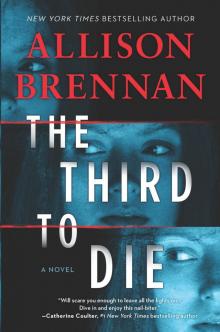 The Third to Die
The Third to Die Nothing to Hide
Nothing to Hide No Way Out
No Way Out Cold as Ice
Cold as Ice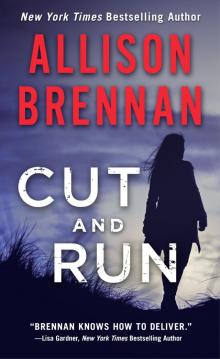 Cut and Run
Cut and Run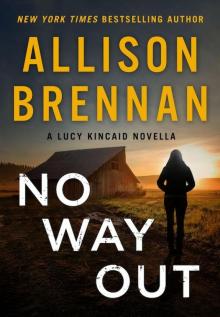 No Way Out (Lucy Kincaid Novels)
No Way Out (Lucy Kincaid Novels) Storm Warning
Storm Warning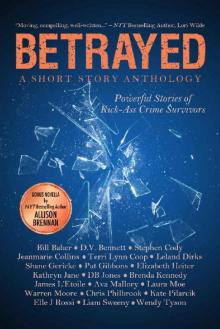 Betrayed: Powerful Stories of Kick-Ass Crime Survivors
Betrayed: Powerful Stories of Kick-Ass Crime Survivors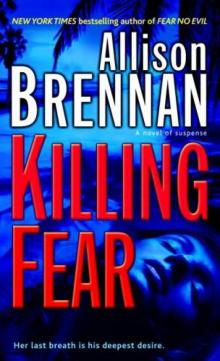 Killing Fear pb-1
Killing Fear pb-1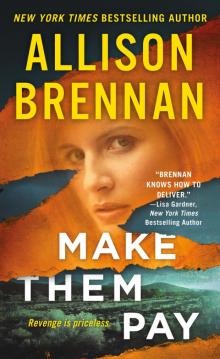 Make Them Pay
Make Them Pay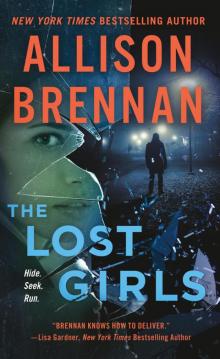 The Lost Girls
The Lost Girls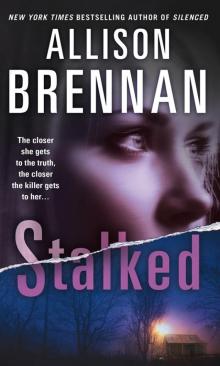 Stalked
Stalked Killing Justice
Killing Justice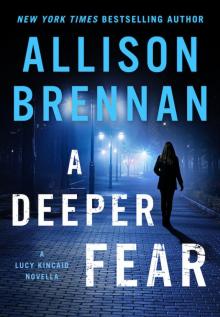 A Deeper Fear
A Deeper Fear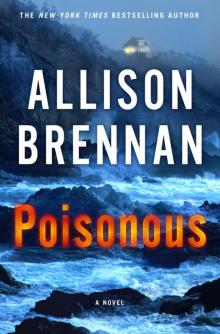 Poisonous
Poisonous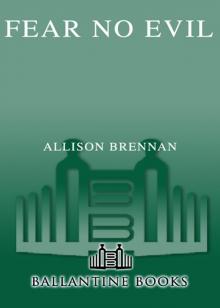 Fear No Evil
Fear No Evil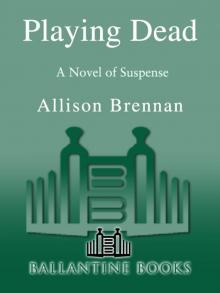 Playing Dead
Playing Dead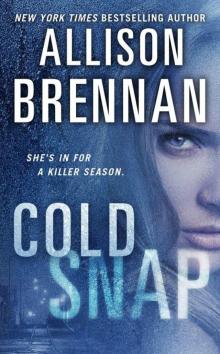 Cold Snap
Cold Snap Vacation Interrupted
Vacation Interrupted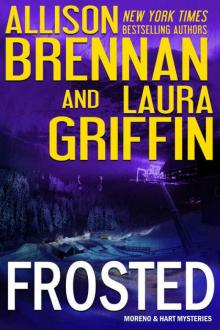 Frosted (Moreno & Hart Mysteries)
Frosted (Moreno & Hart Mysteries)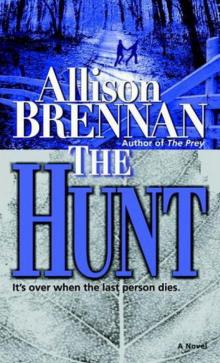 2 - The Hunt
2 - The Hunt Stolen
Stolen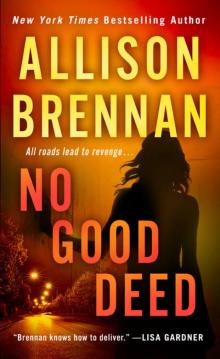 No Good Deed
No Good Deed Cutting Edge
Cutting Edge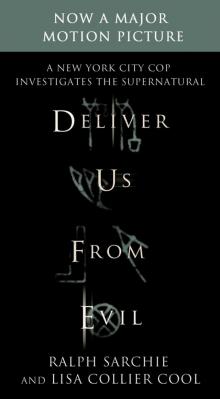 Deliver Us from Evil
Deliver Us from Evil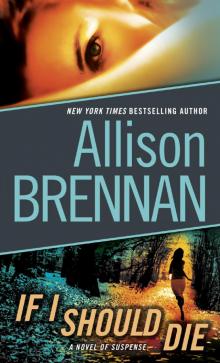 If I Should Die
If I Should Die Speak No Evil
Speak No Evil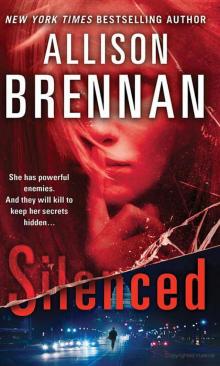 Silenced lk-4
Silenced lk-4 Original Sin sds-1
Original Sin sds-1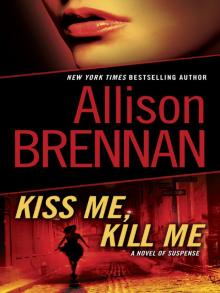 Kiss Me, Kill Me lk-2
Kiss Me, Kill Me lk-2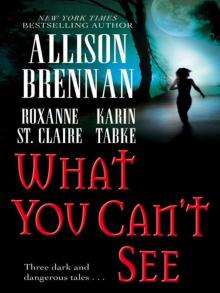 What You Can’t See
What You Can’t See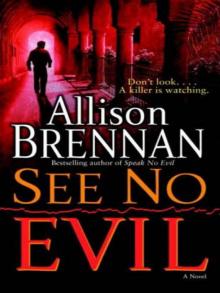 See No Evil
See No Evil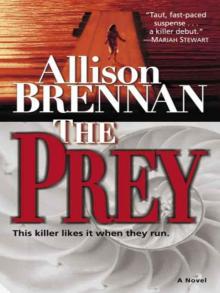 The Prey
The Prey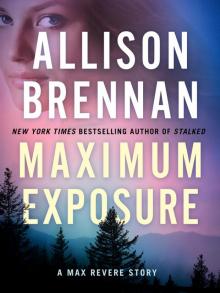 Maximum Exposure
Maximum Exposure Fatal Secrets f-2
Fatal Secrets f-2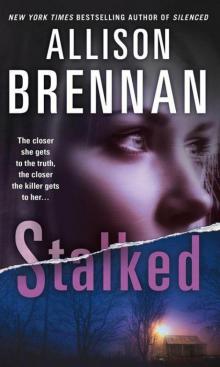 Stalked lk-5
Stalked lk-5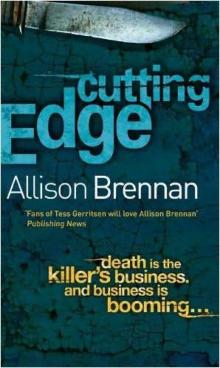 Cutting Edge f-3
Cutting Edge f-3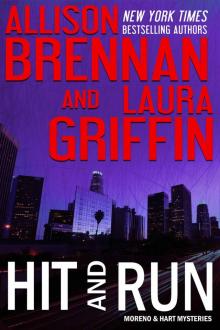 Hit and Run (Moreno & Hart Mysteries)
Hit and Run (Moreno & Hart Mysteries)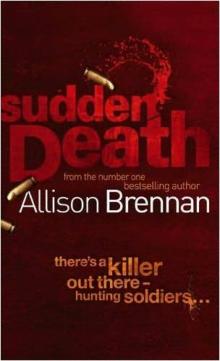 Sudden Death f-1
Sudden Death f-1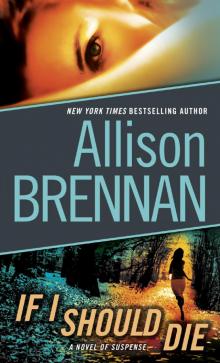 If I Should Die lk-3
If I Should Die lk-3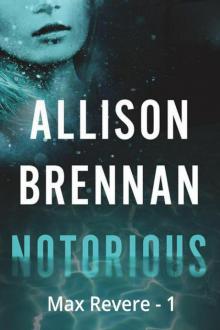 Notorious
Notorious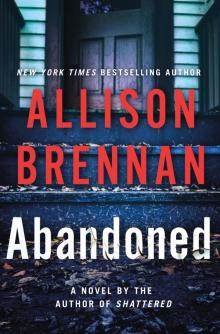 Abandoned
Abandoned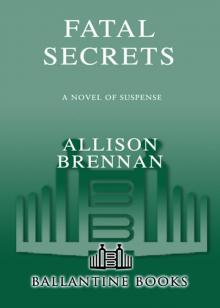 Fatal Secrets
Fatal Secrets The Hunt
The Hunt Carnal Sin sds-2
Carnal Sin sds-2 Love Is Murder
Love Is Murder Lost and Found
Lost and Found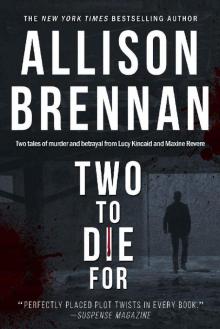 TWO TO DIE FOR
TWO TO DIE FOR Breaking Point
Breaking Point Best Laid Plans
Best Laid Plans Carnal Sin
Carnal Sin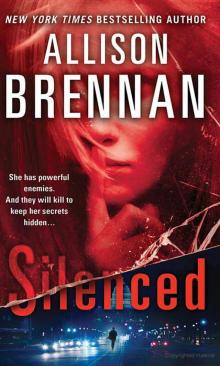 Silenced
Silenced Dead Heat
Dead Heat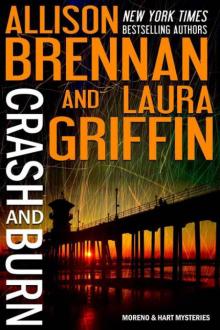 Crash and Burn
Crash and Burn Sudden Death
Sudden Death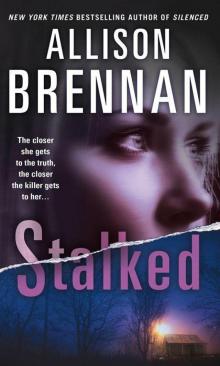 Lucy - 05 - Stalked
Lucy - 05 - Stalked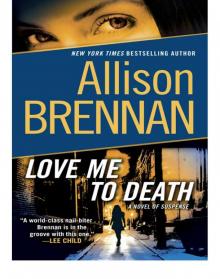 Mortal Sin
Mortal Sin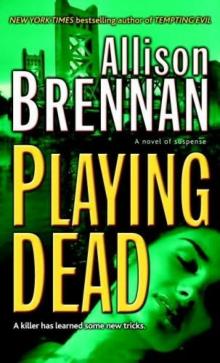 Playing Dead pb-3
Playing Dead pb-3 Kiss Me, Kill Me
Kiss Me, Kill Me Original Sin: The Seven Deadly Sins
Original Sin: The Seven Deadly Sins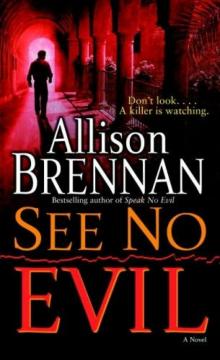 See No Evil e-2
See No Evil e-2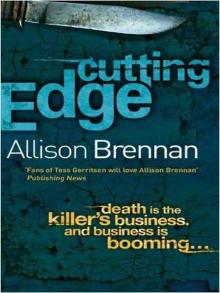 Cutting Edge: A Novel of Suspense
Cutting Edge: A Novel of Suspense Original Sin
Original Sin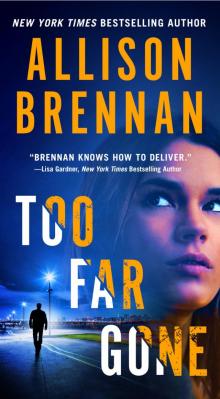 Too Far Gone
Too Far Gone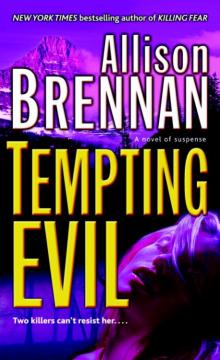 Tempting Evil
Tempting Evil Shattered
Shattered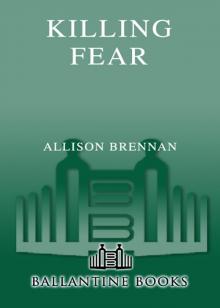 Killing Fear
Killing Fear Murder in the River City
Murder in the River City Love Is Murder (lucy kincaid)
Love Is Murder (lucy kincaid)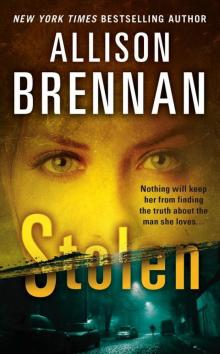 Stolen (Lucy Kincaid Novels)
Stolen (Lucy Kincaid Novels)